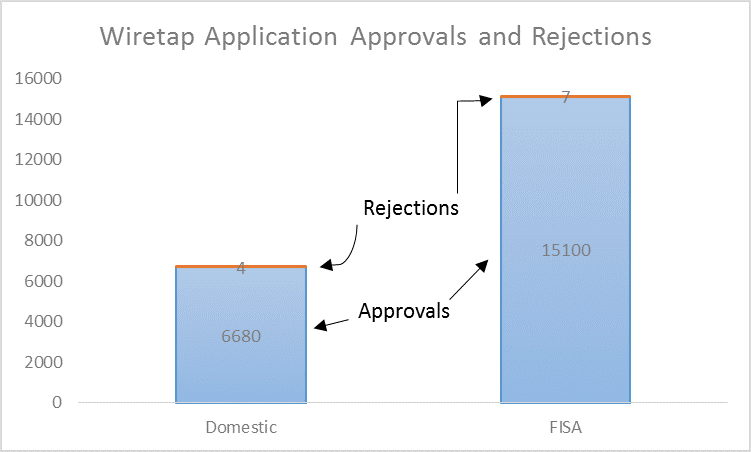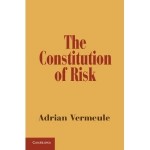 Sources: Thomas Miles, Racial Disparities in the Allocation of Wiretap Applications Across Federal Judges, JLS 2012 ; Wikipedia. Domestic 1997-2007; FISA 2004-2012.
Sources: Thomas Miles, Racial Disparities in the Allocation of Wiretap Applications Across Federal Judges, JLS 2012 ; Wikipedia. Domestic 1997-2007; FISA 2004-2012.
The data source is the new Comparative Constitutions Project website. Compare to the growth of international human rights:
The graph shows increases in the number of human rights as recognized by the various human rights treaties when they went into force.
As I argue in Slate.
 This short, good draft by Balkin (with a very high ratio of ideas to words) seeks to explain the rise of originalism. A starting point is that originalism is (virtually) uniquely an American phenomenon, and a national (not state) phenomenon. Next there is the central role of the founding as a unifying origin myth; the huge impact of the founders in our cultural memory; and the Protestant tradition with its preoccupation with sacred texts and yearning for a purifying return to the fundamentals. But why now? Jack thinks that originalism avant la lettre got started after the New Deal when Justice Hugo Black felt that he needed a justification for overcoming the New Deal quasi-tradition of judicial deference, and took off when conservatives realized that they could use it to bash Warren Court precedents plus Roe v. Wade. Maybe also it is a reaction to modernist anxieties about political foundations provoked by the radical constitutional innovations of the twentieth century.
This short, good draft by Balkin (with a very high ratio of ideas to words) seeks to explain the rise of originalism. A starting point is that originalism is (virtually) uniquely an American phenomenon, and a national (not state) phenomenon. Next there is the central role of the founding as a unifying origin myth; the huge impact of the founders in our cultural memory; and the Protestant tradition with its preoccupation with sacred texts and yearning for a purifying return to the fundamentals. But why now? Jack thinks that originalism avant la lettre got started after the New Deal when Justice Hugo Black felt that he needed a justification for overcoming the New Deal quasi-tradition of judicial deference, and took off when conservatives realized that they could use it to bash Warren Court precedents plus Roe v. Wade. Maybe also it is a reaction to modernist anxieties about political foundations provoked by the radical constitutional innovations of the twentieth century.
I like this piece but my initial reaction is that Jack treats originalism as too much of an idiom–a cafeteria meal from which one may pick and choose–and doesn’t take seriously its constraining power in legal argument. While it’s true that Scalia and Thomas invoke it selectively, and the historical materials are frequently ambiguous, there is a reason it took off in the 1980s rather than the 1950s, and that is that originalism really is conservative, whereas the Supreme Court in the 1950s was liberal. The founders were conservative by today’s standards. They cared a lot about property rights, for example, and very little about discrimination against ethnic groups, sexual freedom, and so on (to say nothing of slavery). So I do not think originalism is as malleable as Jack does; it’s not like speaking Italian rather than French but exerts a right-wing gravitational pull. There is a reason (as the data show) that conservative justices are more likely to cite The Federalist than liberal justices are.
 Adrian Vermeule’s new book, The Constitution of Risk, argues that much constitutional thinking follows a model of “precautionary constitutionalism,” where doctrines are designed to avoid worst-case outcomes. A better approach is what he calls “optimizing constitutionalism,” where such “political risks” are traded off rather than minimized. The Court of Appeals in Noel Canning, for example, appeared to be driven by a fear that if it upheld President Obama’s recess appointments, then presidents could tyrannize by avoiding the Senate altogether. It ignored the countervailing risk that if the recess appointment is limited, important offices would go unfilled. As Cass Sunstein has written in the area of regulation, the precautionary principle makes little sense on its own terms since there are always risks on all sides, and leads to pretty unattractive outcomes even when it can be applied. It’s as if we should all stay in our basements rather than take the risk that flower pot will fall on our heads if we go outside.
Adrian Vermeule’s new book, The Constitution of Risk, argues that much constitutional thinking follows a model of “precautionary constitutionalism,” where doctrines are designed to avoid worst-case outcomes. A better approach is what he calls “optimizing constitutionalism,” where such “political risks” are traded off rather than minimized. The Court of Appeals in Noel Canning, for example, appeared to be driven by a fear that if it upheld President Obama’s recess appointments, then presidents could tyrannize by avoiding the Senate altogether. It ignored the countervailing risk that if the recess appointment is limited, important offices would go unfilled. As Cass Sunstein has written in the area of regulation, the precautionary principle makes little sense on its own terms since there are always risks on all sides, and leads to pretty unattractive outcomes even when it can be applied. It’s as if we should all stay in our basements rather than take the risk that flower pot will fall on our heads if we go outside.
Among the many excellent insights, the one I found most striking was the claim that much traditional constitutional thinking and doctrine has a precautionary-principle cast to it, and is thus vulnerable to the same criticisms as that principle is.
John Coates recently posted a paper on SSRN entitled Cost-Benefit Analysis of Financial Regulation: Case Studies and Implications. This topic has been important ever since the D.C. Circuit struck down an SEC regulation for failing CBA in Business Roundtable in 2011. Glen Weyl and I held a conference on the topic last fall, and have written several papers arguing that, whatever one thinks of the reasoning in the (justly criticized) Business Roundtable case, CBA is the way to go.
The core of Coates’ paper is a description of efforts by agencies (and other institutions or persons) to perform CBAs of six major financial regulations. Coates persuasively argues that the existing CBAs fall flat and expresses skepticism that it is even possible, given the current state of knowledge, for meaningful CBAs of financial regulations (or certain financial regulations) to be conducted. What valuation should we assign to an avoided financial crisis? Hard to say. Coates concludes that while it makes sense for agencies to engage in cost-benefit balancing using rough guesstimates, their efforts should not be subject to judicial review.
Coates’ argument is sensible, but I am more optimistic than he is about the capacity of agencies to come up with numbers. This criticism–and many others that Coates makes–could be (and have been) made about other forms of CBA, for example, CBA of environmental regulation, which has improved greatly over the last 30 years but remains far from perfect. The fact is that when an agency proposes a capital adequacy rule, it is using an implicit valuation for an avoided crisis. The agency should be required to make that valuation explicit, and defend it. We can agree that a wide range of valuations is acceptable and also believe that public discussion of the range is useful.
I have mixed feelings about his criticisms of judicial review. On the one hand, it seems likely that if courts rigorously applied CBA to new financial regulations, we would not have any new financial regulations (a bad thing), at least not for some time. On the other hand, I’m not sure what will encourage agencies to perform CBAs properly–and this means paying money to consulting firms to generate valuations–if judicial review does not take place. OIRA has encouraged non-financial agencies to use CBA, but OIRA has more limited authority over the financial agencies–none at all in the case of the Fed.
Will asks whether originalists should be heartened or troubled by Campbell’s debunking of Justice Scalia’s historical analysis in Printz. However, the majority opinion is not originalist at all. Scalia doesn’t address the historical materials with any rigor; he argues (quite candidly) that the anti-commandeering principle is consistent with the historical record, not that it emerges from the best reading of the historical record. Where does that principle come from? Precedent: “Finally, and most conclusively in the present litigation, we turn to the prior jurisprudence of this Court.” Scalia thinks that New York v. U.S. controls, and the weak foundation-era history provides no basis for overturning it. Would Scalia have switched sides if Campbell’s work had been before him? Hard to know, but I would not advise Congress that it is now free to commandeer.
On The Federalist Papers, given the specific political use for which they were written and published, there is little reason to believe that they represent a general account of the original understanding as it existed in all 13 states. The reason that The Federalist has fetish-value today is simple: it has been cited over and over by the Supreme Court, and so has become a source of constitutional law that supplements the text and other materials.
Source: Westlaw, Supreme Court Compendium (thanks Lee and Bill). N.B.: I’m not distinguishing majority and other opinions. I suspect JM appears in more majority opinions as time passes. (The y variable is the number of cases in which at least one opinion cites JM divided by total number of cases for that year.)
This is the title of a new book edited by Cary Coglianese, Adam M. Finkel , and Christopher Carrigan. The book contains a chapter by me and Jonathan Masur, which builds on, and responds to criticisms of, our earlier article, Regulation, Unemployment, and Cost-Benefit Analysis. In the chapter and article, we argue that when agencies conduct cost-benefit analysis, they should take into account the effects of regulations on job loss.
The book has a broader scope. It focuses also on the larger question on whether regulation kills jobs. The answer, unavoidably, is sometimes. Our view is that even when it does, regulations are justified when the benefits are large enough, and agencies need to make sure this is the case by conducting cost-benefit analysis properly.
Here is my Slate piece criticizing the originalist argument for ruling that President Obama violated the recess appointments clause. A while back I criticized the “the” argument. (Slate used the genius-level headline “Indefinite Articles”). Will Baude co-authored an interesting amicus brief that makes the originalist case for affirming and further argues that if you’re not an originalist, you should defer to the Senate’s right to define what a session is, so either way the president loses.
New paper on SSRN:
The standard model of judicial behavior suggests that judges primarily care about deciding cases in ways that further their political ideologies. But judicial behavior seems much more complex. Politicians who nominate people for judgeships do not typically tout their ideology (except sometimes using vague code words), but they always claim that the nominees will be competent judges. Moreover, it stands to reason that voters would support politicians who appoint competent as well as ideologically compatible judges. We test this hypothesis using a dataset consisting of promotions to the federal circuit courts. We find, using a set of objective measures of judicial performance, that competence seems to matter in promotions in that the least competent judges do not get elevated. But the judges who score the highest on our competence measures also do not get elevated. So, while there is no loser’s reward, there may be something of a winner’s curse, where those with the highest levels of competence hurt their chances of elevation.
Will says that the Supreme Court could have held in favor of Heller on simpler and more intuitive grounds than those laid out in Scalia’s opinion. The purpose of my earlier post was not to argue that a well-reasoned originalist opinion could not be written but to point out that the actual opinions (by Scalia and Stevens) were poorly reasoned and written, and to raise the suggestion that originalism, as practiced by judges, lends itself to bad historical reasoning because judges are not historians but lawyers, and (by necessity) do law-office history rather than real history. Indeed, this very point about the difference between history and law-history is Will’s (“what seems like an intractable historical debate is really solved by a legal or interpretive question about what kind of history matters”). But if Will is right, this disconnects originalism from one of the theoretical reasons for its appeal.
The very reason identified by Michael Rappaport, who says that originalism is appealing because the “idea that a written law should have the meaning that it had at the time of its enactment seems extremely intuitive and part of how we understand legislation and other written enactments.” Exactly: the real understanding, not the understanding that is constructed from legal rules that permit some types of evidence and exclude others–the presumptions, fictions, and tie-breakers that are necessary to facilitate decision-making and enhance the predictability of law. But this is in tension with his statement “the ordinary person is usually an originalist.” Maybe a historical originalist but not a law-office originalist.
But I’m not so sure that the ordinary person is any kind of originalist, because it’s pretty clear that the ordinary person has all kinds of ideas about what his constitutional rights are that cannot be traced to the original understanding—for example, that the national government cannot discriminate on the basis of race, or that government can’t censor artistic expression that offends community standards. In fact, the direction of causation probably goes the other way: people read into history whatever constitutional rights they think they should have now. Our constitutional culture is the residuum of a struggle to reduce the cognitive dissonance between reverence for the founding generation and commitments to modern-day rights and government structure.
Suppose you agree with Madison’s theory that the government should be divided into three branches so that the ambition of each counteracts the ambition of the others. Now a case like Noel Canning arises, in which the executive clashes with the legislature. You ask the Supreme Court to resolve the dispute by enforcing the original understanding of the Constitution, tradition, or whatever other relevant factor under your favorite constitutional theory. Is your prescription consistent with your diagnosis of the problem? Can a (by hypothesis) ambitious judicial branch be expected to resolve a dispute fairly between the other two branches? Wouldn’t it instead resolve the dispute in a manner that maximizes its own power? In which case, why should you bother to argue that it should do otherwise?
These questions are the topic of a new paper I wrote with Adrian Vermeule, just published in the University of Chicago Law Review.
Speaking of originalism, in Slate I criticize originalist arguments made in amicus briefs for the Noel Canning case, which will be argued next Monday. I fear that the Supreme Court’s Noel Canning opinion will be another Heller.